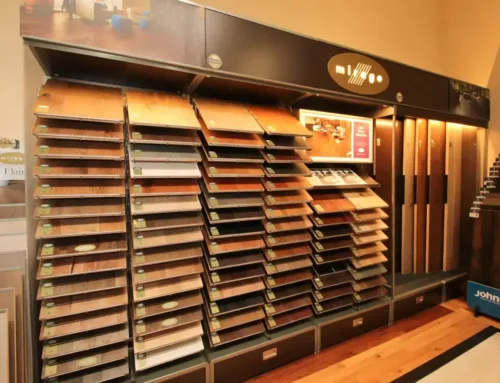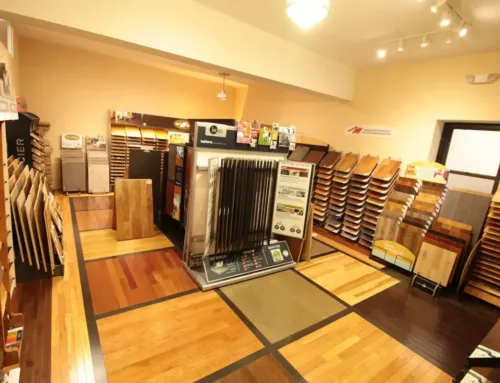The source you choose for wood flooring directly impacts your project’s final quality, budget, and long-term satisfaction. These two purchasing approaches serve different needs and offer distinct advantages depending on your specific situation and requirements.
Wholesale wood flooring provides access to manufacturer-direct pricing and extensive selections. On the other hand, retail options offer professional guidance and comprehensive services that support successful flooring installations.
Can’t find the perfect wood flooring source for your project?
Rustic Wood Floor Supply offers wholesale pricing with retail-level expertise. Our flooring specialists help you navigate quality grades and selections to get the best value for your specific needs.
[Get Your Free Flooring Consultation: (678) 691-0533]
What Is Wholesale Wood Flooring?
Wholesale wood flooring refers to flooring materials sold directly from manufacturers, distributors, or warehouse facilities to buyers at reduced prices, typically requiring minimum purchase quantities or trade credentials for access.
Market- Insight:
The global flooring market size was recorded at USD 349.66 billion in 2024, and it is expected to be worth around USD 652.38 billion by 2034.
Despite this massive market, manufacturers offer 40-60% savings through wholesale channels, yet only 15% of homeowners know they can access these direct-purchase opportunities.
How Wholesale Wood Flooring Works?
Wholesale flooring operates through direct manufacturer relationships that eliminate retail middlemen and their associated markups. Buyers purchase directly from production facilities, regional distributors, or warehouse operations that maintain large inventory quantities.
The wholesale system works by consolidating orders from multiple buyers, allowing manufacturers to offer reduced pricing through volume efficiencies and simplified distribution channels.
Who Can Buy Wholesale Flooring?
- Licensed contractors and construction professionals
- Flooring retailers and specialty dealers
- Property developers and commercial buyers
- Homeowners during special sales events or with minimum purchase requirements
- Bulk purchasers meeting quantity thresholds
Common Wholesale Purchase Scenarios:
- Annual flooring sales events open to public buyers
- Bulk purchasing for large residential or commercial projects
- Contractor orders for multiple simultaneous installations
- Retailer inventory restocking and seasonal purchasing
- Property management companies outfitting multiple units
What Is Retail Wood Flooring?
Retail wood flooring encompasses flooring materials sold through consumer-focused outlets that provide curated selections, professional guidance, and comprehensive services designed to support individual buyers through the selection and installation process.
How Retail Wood Flooring Works?
Retail flooring channels focus on serving individual consumers and small-scale buyers through specialized facilities that offer product displays, expert consultation, and complete project support services from selection through installation.
Primary Retail Channels:
- Local specialty flooring stores with showroom displays
- Big-box home improvement retailers like Rustic Wood Floor Supply
- Regional flooring chains and franchise operations
- High-end design centers and luxury flooring boutiques
- Online retailers specializing in direct-to-consumer sales
Who Shops Retail?
Homeowners represent the primary retail flooring market segment, seeking guidance for individual projects while valuing the convenience and support services that retail channels provide throughout the purchasing and installation process.
Typical Retail Customers:
- Homeowners planning renovation or remodeling projects
- DIY enthusiasts requiring product education and guidance
- Small contractors working on single-room installations
- Interior designers sourcing materials for client projects
- First-time flooring buyers needing comprehensive support
5 Key Differences in Quality: Wholesale vs Retail
Understanding these fundamental differences helps determine which purchasing approach delivers the best combination of quality, value, and project success for your specific needs.
1. Product Grades and Selection
(Comprehensive Range vs. Curated Quality)
Wholesale sources offer complete manufacturer product lines from economy-grade materials to premium selections. This includes exotic species, specialty finishes, and limited-production runs not available in retail. However, buyers must navigate variable lot sizes and accept that premium materials may only be available during specific production cycles.
Retail stores curate selections based on local preferences and proven performance standards. They focus on popular species and finishes that consistently satisfy homeowners while eliminating lower-grade options. This ensures consistent inventory availability and coordinated product lines with matching accessories.
2. Material Condition and Quality Control
(As-Is Sales vs. Guaranteed Standards)
Wholesale purchases involve “as-is” transactions where buyers accept responsibility for material inspection and quality assessment. This means potential minor defects and color variations within tolerance ranges. Buyers might encounter materials with cosmetic imperfections that require careful handling during installation.
Retail locations implement quality control processes that inspect, sort, and guarantee material consistency. They provide predictable quality standards with return policies for defective materials. This quality assurance extends to manufacturer warranty support and standardized handling procedures.
3. Expertise and Customer Support
(Self-Service vs. Professional Guidance)
Wholesale environments operate with minimal customer service infrastructure. Buyers are expected to possess product knowledge and make independent decisions about material suitability. The focus remains on processing orders quickly rather than providing consultation or technical guidance.
Retail stores employ trained specialists who provide personalized consultations and project planning assistance. These professionals help navigate species selection, understand quality differences, and coordinate with design elements. Their expertise ensures proper material selection based on traffic patterns and installation requirements.
4. Installation and After-Sales Support
(Professional Services vs. Independent Coordination)
Wholesale sources rarely provide installation services, leaving buyers responsible for finding qualified installers and coordinating timelines independently. This requires verifying installer credentials, negotiating pricing separately, and handling warranty claims through multiple vendors.
Retail channels offer comprehensive installation services through professional teams with project management. They provide installation warranties, coordinated delivery scheduling, and post-installation support. This ensures single-source accountability and streamlined problem resolution.
5. Price Structure and Value Proposition
(Direct Savings vs. Comprehensive Value)
Wholesale pricing eliminates retail markups through direct manufacturer relationships, offering 30-50% savings. These advantages increase with bulk purchasing and access to overrun materials. However, savings come with additional responsibilities for storage, transportation, and quality assessment.
Retail pricing includes markups that support comprehensive service infrastructures and professional guidance. While upfront costs are higher, this provides value through installation coordination, warranty protection, and ongoing support. The premium pricing prevents costly selection errors that often exceed wholesale savings.
Comparison Table: Wholesale vs. Retail Wood Flooring
| Aspect | Wholesale Wood Flooring | Retail Wood Flooring |
| Price Range | 30-50% below retail pricing | Standard market pricing + markups |
| Quality Grades | Full range (economy to premium) | Curated residential grades |
| Selection Scope | Extensive species & finish options | Popular, market-tested options |
| Material Condition | “As-is” with possible defects | Pre-sorted, guaranteed quality |
| Customer Support | Minimal guidance | Professional consultation |
| Installation Services | None or limited | Comprehensive installation support |
| Warranties | Manufacturer warranty only | Full material & installation warranties |
| Minimum Purchase | Often required | No minimums |
| Return Policies | Limited or none | Flexible return options |
| Best For | Large projects, experienced buyers | Individual homes, first-time buyers |
When To Choose Wholesale Wood Flooring?
Wholesale wood flooring excels for projects where cost savings justify accepting additional responsibilities for quality assessment, project coordination, and installation management.
Ideal Wholesale Projects
- Large-Scale Construction Projects: New construction spanning 2,000+ square feet with professional installation teams.
- Commercial and Multi-Unit Installations: Apartment complexes and commercial facilities need bulk purchasing for significant cost savings.
- Experienced Renovation Projects: Contractors and experienced DIYers with proper storage facilities and established installer relationships.
- Budget-Conscious Large Projects: Extensive renovations where material costs represent significant budget portions.
Top Benefits of Wholesale Wood Flooring
Here are the key advantages that make wholesale wood flooring an attractive option for the right projects:
- Significant Cost Savings: Direct manufacturer pricing eliminates retail markups, reducing material costs by 30-50%.
- Extensive Selection Access: Complete product lines including specialty grades and exotic species not available in retail.
- Bulk Purchase Advantages: Consistent lot matching, reduced per-unit costs, and materials for future repairs.
When to Choose Retail Wood Flooring?
Retail wood flooring provides comprehensive support, quality guarantees, and professional guidance that ensure project success for typical residential applications and first-time buyers.
Ideal Retail Projects
- First-Time Flooring Projects: Homeowners needing professional guidance, quality guarantees, and installation support.
- Single-Room Renovations: Small projects like bathroom or bedroom updates with manageable quantities.
- High-End Residential Installations: Premium projects requiring specific aesthetic standards and design coordination.
- Time-Sensitive Projects: Projects with tight timelines needing coordinated materials, delivery, and installation scheduling.
Smart Money Move:
Here’s what most flooring companies won’t tell you: 67% of DIY flooring failures result from improper material selection rather than installation errors. Retail guidance prevents these costly mistakes that often exceed the initial savings from wholesale pricing.
Top Benefits of Retail Wood Flooring
Here are the key advantages that make retail wood flooring the right choice for many homeowners:
- Professional Project Support Comprehensive consultation services ensure proper material selection and coordinated installation scheduling.
- Quality Guarantees and Warranties Retail warranties cover both materials and installation, protecting against defects and performance issues.
- Convenient Project Management Single-source responsibility for materials, delivery, and installation eliminates coordination issues between multiple vendors.
- Design and Aesthetic Support Professional design consultation ensures flooring selections complement existing decor and meet aesthetic goals.
How to Choose the Right Option for Your Project?
Success with either wholesale or retail wood flooring depends on matching your purchasing approach to your specific project requirements, experience level, and support needs.
Step 1: Assess Your Project Scale and Requirements
Start by evaluating your project’s scope, timeline, and complexity to determine which purchasing approach aligns with your actual needs and capabilities.
Project Scale Indicators:
- Total square footage requiring flooring installation
- Number of rooms or areas involved in the project
- Timeline constraints and scheduling flexibility
- Budget allocation for materials versus services
- Storage capacity for bulk material deliveries
Experience Level Assessment:
- Previous flooring installation or renovation experience
- Comfort level with quality assessment and material inspection
- Access to qualified installers and project coordination resources
- Knowledge of flooring grades, species, and installation requirements
Step 2: Calculate Your Budget and Value Priorities
Understanding your true budget requirements helps determine whether wholesale savings or retail services provide better overall value for your specific situation.
Budget Calculation Framework:
- Material costs at wholesale versus retail pricing
- Installation costs for professional versus DIY approaches
- Storage, transportation, and handling expenses
- Potential costs from material defects or installation errors
- Long-term warranty and maintenance considerations
Step 3: Evaluate Your Support and Service Needs
Consider your requirements for guidance, warranties, and ongoing support to determine whether wholesale independence or retail services better match your project needs.
Support Requirement Questions:
- Do you need professional guidance for material selection and planning?
- How important are installation warranties and service guarantees?
- Can you manage quality inspection and material coordination independently?
- What level of ongoing support do you require after installation?
- How comfortable are you with accepting “as-is” material conditions?
Step 4: Consider Storage and Logistics
Wholesale purchasing requires adequate storage facilities and logistics planning that may not be necessary with retail coordination and just-in-time delivery services.
Storage and Logistics Considerations:
- Climate-controlled storage space for material acclimation
- Capacity for bulk deliveries and extended material storage
- Transportation resources for moving materials to installation sites
- Protection from damage during storage and handling
- Scheduling flexibility for material delivery and installation coordination
If you’re looking for expert guidance without the retail premium, our experts provide professional project planning and material selection support while maintaining wholesale-competitive pricing structures.
[Get Professional Project Planning: (678) 691-0533]
Tips for Success with Either Option
Regardless of your chosen purchasing approach, following these essential practices ensures successful flooring projects and optimal long-term satisfaction.
Quality Assessment Guidelines
Essential Quality Factors:
- Wood species hardness ratings appropriate for traffic levels
- Moisture content, within acceptable ranges for your climate
- Finish quality and scratch resistance for intended use
- Dimensional stability and manufacturing consistency
- Grade specifications matching project requirements and expectations
Pro-Tip:
Always request samples from multiple lots when buying wholesale, and inspect retail display samples under different lighting conditions to understand how the flooring will appear in your specific space.
Critical Questions to Ask Any Source
Material and Quality Questions:
- What grade and species best suit my traffic levels and usage patterns?
- What moisture content and acclimation requirements apply to my installation?
- What warranties cover materials, installation, and long-term performance?
- What return policies apply if materials prove unsuitable or defective?
- What installation requirements and professional recommendations apply?
Accurate Quantity Planning
Quantity Calculation Essentials:
- Precise room measurements, including all irregular areas
- 10-15% waste allowance for cuts, defects, and future repairs
- Pattern matching requirements for specific flooring styles
- Transition pieces and trim material quantities
- Professional measurement verification for complex layouts
Smart Money Tip:
Under-ordering wholesale materials often means waiting weeks for matching lots, while over-ordering retail materials typically allows returns within reasonable timeframes, making retail more forgiving for quantity miscalculations.
Takeaway
The choice between wholesale and retail wood flooring ultimately depends on your project scale, experience level, support needs, and value priorities rather than inherent quality differences in the materials themselves. Most successful flooring projects align the purchasing approach with actual project requirements, experience levels, and support needs rather than choosing based solely on price considerations.
At Rustic Wood Floor Supply, we’ve helped over 500 homeowners and contractors achieve stunning flooring results without the traditional trade-offs. Our experienced team ensures you get materials perfectly matched to your project’s specific needs, traffic requirements, and aesthetic goals.
The best part? Our transparent pricing means you know exactly what you’re paying for, and our comprehensive project support ensures your flooring installation exceeds expectations from selection through final installation.
Stop choosing between great pricing and great service. Get both at Rustic Wood Floor Supply!
Frequently Asked Questions
1. Is wholesale wood flooring only available to contractors and retailers, or can homeowners buy it too?
Homeowners can often buy wholesale wood flooring through annual public sales events, minimum quantity purchases, or by working with contractors who pass through wholesale pricing for specific projects.
2. Does buying wholesale wood flooring mean sacrificing quality compared to retail options?
No, wholesale and retail often source identical materials from the same manufacturers. Quality differences stem from selection curation, quality control processes, and support services rather than material manufacturing standards.
3. What are the main differences in product selection between wholesale and retail wood flooring?
Wholesale offers broader grade ranges and species selections, including economy options, while retail provides curated selections focused on popular residential grades with consistent availability and quality standards.
4. Are there risks to buying wood flooring from big-box retailers compared to specialty flooring stores or wholesalers?
Big-box retailers may offer limited selections and minimal expertise, but provide convenient returns and warranties. Quality depends on specific products rather than retailer type, requiring careful evaluation regardless.
5. How do wood flooring grades affect quality and appearance?
Flooring grades determine allowable defects, color variations, and character marks. Higher grades show fewer natural variations and defects, while lower grades include more character features at reduced pricing.
6. What should I consider before buying wholesale wood flooring for a home project?
Consider storage capabilities, installation expertise, quantity accuracy, quality assessment skills, and project timeline flexibility since wholesale purchases typically require more buyer responsibility and planning coordination.
Author Profile
- I have worked in hardwood flooring for the last 8 years. Use to run a company of residential crews as well as a company with gym flooring. If you need floor installation or refinishing help, I should have an answer or at least get you in the right direction.
Latest entries
 FlooringJanuary 15, 2026Does New Hardwood Flooring Increase Your Home Value?
FlooringJanuary 15, 2026Does New Hardwood Flooring Increase Your Home Value? FlooringJanuary 14, 2026Can You Refinish Engineered Hardwood?
FlooringJanuary 14, 2026Can You Refinish Engineered Hardwood? FlooringJanuary 10, 2026What Wood Floor Color Do I Choose?
FlooringJanuary 10, 2026What Wood Floor Color Do I Choose? FlooringJanuary 9, 2026How To Prevent Hardwood Floor Moisture Problems?
FlooringJanuary 9, 2026How To Prevent Hardwood Floor Moisture Problems?



